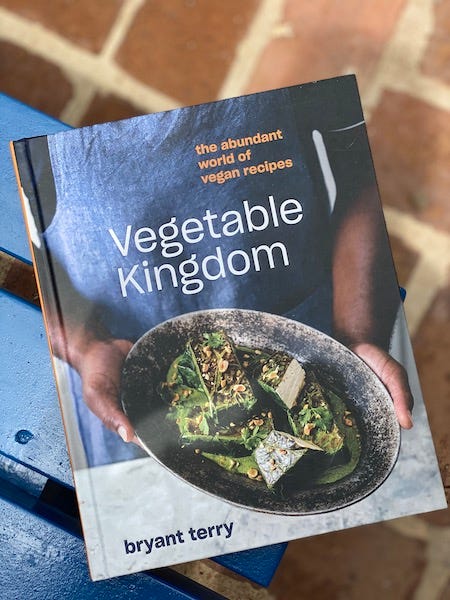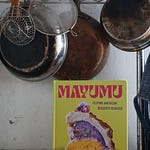
When I launched “Meatless: A Podcast About Eating” in 2018, one of the people I knew I wanted to talk to most was Bryant Terry. That didn’t work out until this week, but I’m so thrilled to have had the opportunity to speak with the chef, activist, and cookbook author about his upbringing, the inspiration for his veganism, using the term “food apartheid” rather than “food desert,” the definition of food justice, and much more.
The author of, most recently, Vegetable Kingdom: The Abundant World of Vegan Recipes, as well as Afro-Vegan,Vegan Soul Kitchen, and more, has worked with the Museum of the African Diaspora in San Francisco as the chef-in-residence since 2015. He is a James Beard Award winner and lives in Oakland, California.
Usually, these Friday interviews are for paid subscribers, but I wanted to share this one with everyone. Listen above, or read below.
Alicia: Hi, Bryant, thank you so much for taking the time to chat with me today.
Bryant: Thank you so much for having me. I've been a big fan of your work for a minute and have wanted to connect. So I'm glad we can make it happen.
Alicia: I'm so glad, too. Can you tell me about where you grew up and what you ate?
Bryant: Sure. So I grew up in Memphis, Tennessee. And, you know, I think it's always important to talk about my family's roots, which are in rural Mississippi, Tennessee, and Arkansas. And the fact that we had farms that we owned, and I got a chance to, you know, visit one of the farms. Unfortunately, as many African-Americans experienced throughout the 20th century, two of the farms that we had actually were taken away from us. It's important for me to really put the work that I'm doing and the kind of practices that I promote in context.
I always say that, really, I'm simply imparting the lessons that I learned by my elders and ancestors, because many of the practices that I would argue are rooted in survival, some in pleasure, you know, things such as growing food at home, canning and pickling and preserving, making meals from scratch—these were the type of practices that my grandparents, they were just kinda central to the way that they lived. And, you know, I say that because so often when we talk about these things, they are kind of attributed to—or at least the stories that we hear often about, at least as of late—young urban gentrifiers who are taking on these practices as a way to push back against our industrialized food system.
For me, it's important to recognize that working-class, working-poor, rural and urban Black folks, particularly in the south, have embraced these practices. It's about understanding that this was just a way that they lived; they didn't feel any need to name it or kind of classify it; it’s just growing food was cheaper, growing food made sense; they had the agrarian knowledge and skills that they wanted to apply in an urban context. Our food was as local as our backyard garden. We mostly ate what was in season and we would often literally go out and harvest food right before we made it. That's really the foundation of all the work that I'm doing, and I stand on the shoulders of ancestors and elders who taught me these things when I was a child.
Alicia: How did you end up eating a vegan diet or getting connected to the world of veganism?
Bryant: Once again, I think it's important to acknowledge that my early kind of contact with these ideas came from Black folks. When we talk about the vegetarian, vegan diet, plant-based eating, or however you want to talk about it, you know, once again, so often in the popular imagination, you know, people immediately go to the practices of these upper-middle-class white suburbanites, or the kind of urban gentrified white hipsters, and the first time that I even learned about vegetarian and veganism, it was from some Black family members who were Seventh-Day Adventists; obviously theirs were theologically driven practices around eating in this way, but that was the first contact that I came into.
I would say the pivotal moment as a young person that launched me into food activism—and I can talk about what that food activism looks like in a second—was when I heard the song “Beef” by the rapper KRS-One and Boogie Down Productions, in which he just so brilliantly talks about the impact of factory farming, not only on animals, but on human health and the environment. That was a major shift in my habits and attitudes and politics around food.
One of the things that is so funny—it's funny now, but back then, I'm sure my parents were really disgusted with me, because whatever stereotypes one has of the self-righteous, dogmatic, finger-wagging vegans, that was how I was showing up. And there were a lot of fights and me haranguing them and trying to get them to shift their diet, even though I just changed like the week before. And that was a great lesson. I really carry that period with me, because it just showed me that the least effective way to help people think about changing their habits and attitudes and politics regarding food is yelling at them and screaming at them and making them feel wrong for the way that they're, you know, just living their lives. And so as someone who's worked with young people for the better part of two decades—and specifically starting this work around food justice activism—working with young people, I realized that there are more effective ways to help young people think more deeply about their relationship with animals in the natural environment, and for me that was actually cooking.
When you hear about these types of dietary practices and political positions, I think a lot of people default towards people like Peter Singer and John Robbins and Frances Moore Lappé, and, you know, they certainly are important thinkers and activists and have inspired a lot of my work—two of them being personal mentors. But I just always have to pivot back to: my early teachers were all Black folks.
I mean, we could talk about just me hearing this song by KRS-One and Boogie Down Productions, and the way in which that just totally transformed my relationship with food, and then starting to spend a lot of time at the health food store in downtown Memphis and I connected with this community of Black folks who had been vegans for decades. It was interesting, because it was such a diverse group of folks. I mean, the people I felt drawn to the most initially were Rastafarians, and there were a number of Rastas who would shop there and who would hold court in the little prepared eating section, and so I would talk to them and just learn more about the ital diet, but, you know, it's pretty much parallel to what we think of as an ethical vegan diet. But I also met older Black folks who, for whatever reason, had shifted from a standard American diet to plant-based diets and learning about their journeys and not just around consumption but also, you know, these are folks who had agrarian roots. That's where I started to get interested in gardening, because they would talk to me about the importance of growing food and contributing to local food systems.
I think it is vitally important for me to really name and claim these Black elders and thinkers and writers and activists and uplift this thread of Black-led food activism throughout the 20th century, whether we're talking about the, you know, theologically based health ministry of the Seventh-Day Adventists or we could look at the Nation of Islam and Elijah Muhammad's health ministry. I mean, he wrote two books, How to Eat to Live, and was very focused on how food can both heal and hurt Black communities. We can talk about Dick Gregory, who was a major inspiration, and reading his book Cookin’ with Mother Nature in high school and listening to his lectures. These were the people that I would say deeply inspired me to feel like I can contribute to this conversation through my activism and, eventually, writing.
Alicia: And how do you define food activism and food justice? And can you give a picture of how your work has manifested in those areas?
Bryant: I'll focus on food justice activism. Food justice activism—it moves beyond advocacy and direct service, and I think it calls on organized responses by the people who are living in these historically impacted communities, the people who are most impacted by food injustice. And, as you know, there's often been—well, I don't know if, I'm sure, yes, you do know about this—but having been in it for like two decades, it would frustrate me to go to these national gatherings around improving our food systems, you know, helping to create more healthy, sustainable food systems or whatever language they use. And so often, or I would say most of the time, at least back in the early 2000s when I first started doing this work, the people who are most impacted by these issues, whether it's migrant farm laborers, or folks who are living in these historically marginalized communities that are often described as food deserts—I have problems with that term; we can talk about that—or young people, who are the victims of our industrialized food system, being just so aggressively marketed to, eating the worst foods and drinking the worst beverages, and so I just felt like, Look, we need to think differently about that.
I think, for me, food justice activism is about the people who are being impacted leading and driving the change, and that means that there needs to be a shift in power and resources towards those communities, because folks know when things are awry and people have creative solutions, and they're implementing those solutions on the ground in communities. What's needed is more resources to actually scale those projects, pay people for their labor, and really empower people to continue to improve these communities in the ways that they best think that those communities need to be improved.
Alicia: And you mentioned the term “food desert” and it being problematic. I know it's been kind of discredited in food studies, and no one is supposed to use it anymore. But from your perspective, what is the—because it's become such a common term. It's so commonly trot out. And we think we know what people mean by that, but yeah—what are the problems with the term food desert?
Bryant: Well, I think my mentor Karen Washington, the farmer in New York City slash State, is so articulate in describing the issues with that term and how if we're talking about power, if we're talking about historical structures that have prevented people from having access to healthy, affordable, and fresh food, I think the term that's in parlance among a lot of the far-left activists now is food apartheid.
I think with food desert—I've always felt like it's a weird term, because it's almost natural. We think about deserts: it's kind of like this natural environment. First of all, I mean, deserts are these thriving ecosystems, but that's a whole other thing.
The problem is that that term erases the historical process in which many communities, which were once thriving local food systems, then became these quote unquote food deserts.
When I talk about my grandparents’ neighborhood, I mean, these are working-class Black folks living in South Memphis, Tennessee, and their neighborhood, their community was a thriving local food system that was driven by just the people who live there. We could talk about my grandfather's urban farm in his backyard; we could talk about many of the neighbors who also had gardens and farms or mini-orchards or who were just growing tomatoes on their front porch in pots. It saddens me when I go back to that same community now and it's like a shell of itself. I'm like, What happened to all the stone fruit trees? It used to seem like every house had some peach trees, nectarines, pear trees. And then statistically, we know that that community has some of the highest rates of preventable diet-related illnesses. And so when I think about deindustrialization; I think about the defunding of programs of public schools in these communities; it's very clear the process that prevented them from continuing to be the thriving or having these thriving local food systems.
I think food apartheid kind of squarely helps people get straight to the point and understand the ways in which power and privilege play into how people can access healthy, affordable food.
Alicia: Well, right now, during the pandemic, there's so much discussion about how the cruelty of specifically the factory farming industry will move people toward plant-based eating but I mean, from my perspective, and I'm sure from yours, none of this was a secret—the reality of the conditions for the workers, the reality of the treatment of animals, etc., etc. But from your perspective, do you think that this moment might actually inspire real change around people's consumption habits or around their mindfulness around food issues?
Bryant: I don't know. I think it depends on where you are. I mean, I think about the stories that my parents are sharing about the region that they live in, which is the southeast—they live in Alabama—and just how quickly folks are reverting back to whatever they imagined the norm would be. And, you know, it's just like the same type of patterns of over-consuming and—whatever. My mom was saying that, throughout this, when she ventures out, the lines at drive-throughs and fast-food restaurants are down the street.
I hope that a lot of people are thinking more deeply about these issues. I know, in somewhere like the Bay Area, of course people are, because it's so pervasive, and you have many institutions that are helping bring the type of food that might have been going to restaurants to consumers, and all these CSAs have been popping up. The farmers’ markets have been making more accommodations to, you know, allow people to shop because they're just frustrated by waiting two hours in a long line to go to the conventional supermarket or whatever.
But I think I'm more interested in if this moment will inspire people to think more deeply about— maybe this is a stretch if we can't even think about eating differently—but I'm thinking about the ecological context for this and other pandemics and really understanding that if we don't get to the root causes of why we're in this moment, we're just going to continue to see this happening over and over again, and the problem is going to be much worse as we move forward and climate chaos continues to have its effect.
I think people need to understand that this current ecological crisis—well, this pandemic is connected to an ecological crisis that is rooted in an economic crisis, which is capitalism, right? If we don't get a grip on all that, and I think there needs to be more awareness about how, as humans, our relationship with animals, whether they're wild or domestic, they're the core of the majority of these epidemics and our current industrialized food system will continue to put us in position where we're going to be dealing with these types of global pandemics and wildfires and climate chaos, and everything that we've been seeing over the past several years.
I want to see people in communities self-organizing to meet their needs right now. I want to see us thinking about ways that we can remake our economy towards a just and livable future. If we get to the root of those things, I think these kinds of crises will be much easier to control or capture—they won't get as bad as it's gotten over the past couple months.
Alicia: I think the media in the beginning was talking a little bit about the ecological roots of the pandemic crisis, and now it's moved into this full-on, back to the individual and the consumption choices rather than focusing on more macro issues that are the reason that we are in this problem anyway.
But that brings me to another question I had for you, which is I've talked to a lot of people about how kind of the last most recent wave of this push to farm-to-table and seasonal eating and locality didn't really work. And so in terms of really changing broadly, at least American people’s, in the United States, relationship to the food system, do you have any concrete political visions for how the food system and even how food media can become more justice-oriented in how it grapples with various issues?
Bryant: Well, when this all jumped off I was really hopeful that a historical moment such as this would push more people to be a little more justice-oriented when it comes to thinking about food. And, you know, as I said, I think we're already seeing the signs that a lot of people, once they get back to whatever they think of as normal, they're just going to revert to many of the same consumer habits they had pre-shelter-in-place. I think any movements promoting farm-to-table and seasonal eating, I mean—they're just empty and selfish, frankly, if they don't focus on the people growing and harvesting and transporting and cooking our food. Especially when we know that globally, the people most impacted by hunger and food insecurity are the people who are producing the food that we eat. I think I read that up to 80% of the world's chronically hungry are farmers.
I've been doing this work for like two decades. I've seen most of the people and organizations who aggressively promote this shallow farm-to-table movement without a justice lens. I think a lot of them are the same folks who emphasize consumer action as the best way to improve our food system, right? You just go to the farmers’ market or if you buy organic and fair trade, that's what's gonna change our food system, if everybody just does that. And I think that, going back to your question around how do I define food justice or the food justice movement, I think that this movement understands that social and economic justice are central to this project.
I really recognize that when we talk about lack of access to healthy, fresh, affordable food or whatever, that's simply one—and I’ve saying this for the longest time—that's one indicator of material deprivation. In these communities, most often the most food-insecure communities and the most food injust communities dealing with food apartheid are the ones who are also dealing with environmental racism, crumbling infrastructure, underfunded, segregated public schools, lack of green space to even be physically active so you can improve your overall health, and so if we don't get to the root of all these issues, then it's kind of like spinning our wheels.
I think people—just like the media, everyday eaters, consumers, politicians—I think people need to care about the most vulnerable people in our society. We know that so many of the elected officials who are making policies, they're beholden to the wealthy donors or corporations that are lining their pockets.
I can't say I have concrete steps for improving our food system, because I think those type of steps we've taken in community. I think they need to be localized. I think they need to be about communities coming together and determining what's the best pathway forward for creating parallel systems outside of capitalism, for showing love and care for communities. And to be honest with you, I've realized some of the organizations who are doing this in the most effective ways, in my opinion, they aren't even food-justice-focused organizations.
I think about two of the most prominent or two of the most inspiring examples for me, are the Movement for Black Lives and Movement Generation, which is a Bay Area–based collective that is doing some amazing work around really getting to the core of, you know, the root of this ecological crisis and how it's impacting all these natural systems and economies and everything. If you look at their platforms and position papers, they’re certainly addressing food apartheid and see that as a primary issue that we can focus on when improving our communities, but they're also talking about ending climate chaos, really helping us to reimagine how we can form new relationships to nature and energy; they’re talking about reparations. Literally creative ways of repair communities, but also ensuring that Black Americans are compensated when we recognize that modern capitalism was fueled by the institution of slavery and all the aftereffects: Jim Crow, the prison industrial complex, like these reinventions of systems that continue to oppress and marginalize Black folks. I look to them. Those are the groups that I study.
Movement Generation has been doing this brilliant—they just started this whole four-week series, where they're doing these Zoom sessions to really help people understand the roots of this pandemic, the connection between our ecological crisis and capitalism.
I also think that we should be looking towards the Global South and some of the amazing organizing I've learned about from mentors like Raj Patel and others who are seeing peasant farming and farmer organizing and really understanding how communities who control their own labor and are able to self-organize to meet their community needs while pushing for structural change is the kind of model that we need to be adapting to as we think about imagining what this world looks like post-whatever this moment is.
As of late, some of the people who've inspired me, I've been revisiting Leah Penniman’s book, Farming While Black. You know, I’m certainly excited about what she's brought to the conversation in terms of economic empowerment, and really ensuring that some of the most vulnerable people in our communities, namely women of color, can have these economically sustainable businesses and feed their families. I love the way that Tunde Wey has been pushing us to think about these larger issues, like using food as a way to talk about things such as the racial wealth gap or whatever issues he's focusing on at the time. Sorry for being a little verbose.
Alicia: Tunde has been the man of the hour lately, which has been amazing to watch because he's really pushing people in food media especially to talk in ways that they have been so incapable of talking before, and I think that he put out fermented locust beans—I forget the actual name of them; it's escaping me right now [Note: It’s Iru.]—but with Burlap and Barrel. I don't know if you're familiar with their spices, but they're wonderful, and it sold out basically immediately. I saw the announcement, I went to buy them, and they were gone. And I was like, Wow. I'm excited about that.
But your most recent book isVegetable Kingdom. And for me, I mean, I'm not a big person to cook recipes specifically, especially right now, because I'm just basing out things on what I have and what's around, but I've been opening your book so much just to find some inspiration for flavors for anything, for ingredients. What are you going to in terms of cooking for inspiration lately, if anything?
Bryant: Well, first of all, I'm really happy to hear that you've been finding some inspiration in the book. I certainly don't expect that everyone will be cooking from it, and that's one of the reasons that my approach has been kind of creating this multilayered book with beautiful images with obviously the recipes, the music, and then slipping in some sociopolitical head notes. And I just see it at the end of the day, I see writing books as my act of love and care for our community. So whether people are just flipping through inspired by the images or listening to the playlist on Spotify or actually making the meals, I'm just glad people are engaging with it, because I have a similar way that I engage with my cookbooks.
In terms of what I've been actually cooking from—I would say I was really going when it was a little cooler, it might be a little too hot for that, I need to revisit it—but I was cooking a lot from Season by Nik Sharma. Lately I've been going back to one of my favorites, kind of like my little cooking bible, Eat by Nigel Slater, in terms of just simple, ingredient-driven, mostly quick meals. Jubilee by Toni Tipton-Martin is amazing.
It's been great just kind of exploring, revisiting a lot of these histories and modifying the recipes to suit my family's needs. The We Are La Cocina book is super dope and amazing and—not so much now, but I would say hardcore for the first month of the shelter in place, I was really going hard with Cool Beans by Joe Yonan and Steve Sando’s Heirloom Bean Guide. I don't know if you've seen that one—it’s a beauty. Those have been some of the books that I removed from my workspace and brought in the house so that they're handy, though I would say those are like some of the top ones.
Alicia: For you, is cooking a political act?
Bryant: Most certainly. I would say my understanding of cooking being a political act is what
really moved me to engage in food justice activism.
Before I got into the food world, I was actually a doctoral student at NYU, and my advisor was a brilliant historian named Robin D.G. Kelley. His second scholarly monograph—I don't know if he wrote any books between his first one—but his second monograph is called Race Rebels. Basically what he does is, he's kind of looking at methods of resistance adopted by Black working-class folks in the 20th century to resist capitalism and white supremacy. He talks about things like slow-downs, quitting on the spot, leaving work early—really the subversive acts that were the unorganized ways that many people would resist these systems of oppression. There's also more organized labor unions and things like that. That book helped me to develop this kind of bifocal approach where I'm thinking about larger systems and structures but also acknowledging and uplifting these kind of everyday acts of resistance.
When I think about something like cooking or gardening or, you know, building community with family around the table, I think a lot of people might see these as apolitical. I would argue in our industrialized world that's controlled by a handful of multinational corporations that are invested in you shopping at these corporate-owned supermarkets or eating at fast-food restaurants or stuffing your face really quickly so you can get back to work, I would argue that making meals from scratch, growing your own food, gathering around the table are highly political and, dare I say, radical. In and of themselves, they're not enough to continue to transform our food system, but I think they need to be uplifted alongside more organized forms of radical resistance to these oppressive systems.
Alicia: Well, thank you so much, Bryant, for taking the time out to chat today.
Bryant. My pleasure, thanks for having me.









